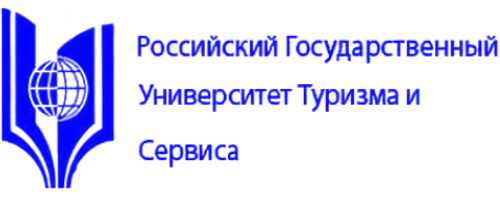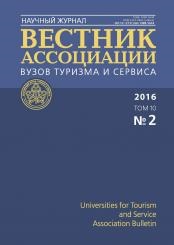Moscow, Russian Federation
This article outlines the main features of the study of organizational and methodological basis of the development of the national concept of vocational tourism education of Russia on international experience. The study was conducted from 2008 to the year 2016 and consisted of several stages. The first stage was characterized by the analysis of scientific literature on the problems of professional education in the field of tourism with the aim of defining paradigms of development, the specifics of the formation of the national industry model of education, the ratio of global and national interests in the simulation of the system of professional tourist education, methodology of pedagogical system study, conceptualization and modeling. During this period, was studied the world experi- ence of professional tourism education and identified 9 Western models of greatest interest in the context of the study: Australia, Austria, UK, Germany, Canada, Norway, Finland, France and Switzerland. The second stage was a program of experimental work and launched the preparatory phase of its implementation. Identified the characteristics of the actual public demand for specialists tourist profile; identified the dominant behavior patterns of graduates of tourism institutes; developed procedures and content of evaluation of professional competencies in tourism. The third stage was characterized by the generalization of theoretical and methodological approaches and of representations associated with the research and development of organizational-pedagogical conditions of implementation of the national system of professional tourism education. Was the experimental work with the aim of ascertaining the current status of personnel training for tourism in Russia, as well as testing a number of conceptual provisions of the theory of systemic organization of professional tourism education, concerning its structure (unity of subsystems: consumer, content, function and regulation), educational content and evaluation of its re- sults. During the fourth phase was analyzed organizational-pedagogical model of Western countries, summarized the results of their comparative analysis, which identified global trends and invariant constructs the international system of professional tourist education. At this stage, identified the essence and developed the conceptual basis of formation of national system of professional tourism education in the context of solving problems of modernization of the industry education and taking into account external trends and challenges. At the fifth stage was developed and piloted innovative courses, academic disciplines, and innovative training course of teachers training areas «Tourism» and «Hospitality»; the identified indicators of the level of satisfaction with the quality of the educational product consumers (employers of tourism and of graduates of educational institutions) on the effectiveness of technology praxiological learning in educational institutions in the field of tourism. This article describes the relevance of the main problem, object, subject, topic, hypothesis, aim, objectives and main results of the study.
professional tourism education, sector-specific model of education, monitoring of external trends and challenges in education, praxeological
1. Sakharchuk E.S., Analiz zarubezhnykh modelei podgotovki kadrov dlya sfery turizma: Monografiya (Analysis of foreign models of staff training for tourism: Monograph). Moscow: Knorus, 2015, 176 p. (In Russ).
2. Sakharchuk E.S., Organizational aspects of professional skills improvement in tourism. Aktual’ni problemy ekonomiky, 2015, Vol. 166, no. 4, pp. 327-330. (In Russ).
3. Sakharchuk E.S., Accounting for globalization processes as the principle of comparative analysis of pedagogical models of education in the field of tourism. Vestnik Assotsiatsii vuzov turizma i servisa, 2015, no.1 (9), pp. 77-85. (In Russ).
4. Sakharchuk E.S., Fedulin A.A., Moscow regional education cluster in tourism and service, Vestnik Assotsiatsii vuzov turizma i servisa, 2014, vol. 8, no. 2, pp. 49-55. (In Russ).
5. Sakharchuk E.S., Kharitonova T.V., Il’kevich S.V., Shtremberg P. Contemporary approaches to curriculum optimization for the educational programs of the academic bachelor in tourism. Vestnik Assotsiatsii vuzov turizma i servisa, 2014, no. 4 (8), pp. 31-36. (In Russ).
6. Ausbildungsreport 2013. Available at: URL: http://www.jugend.dgb.de.
7. Bok D., Universities in the Marketplace: The Commercialization of Higher Education. Princeton: Princeton University Press, 2004, pp: 256.
8. Brennan J., Lore A., Little B., Cochrane A., Williams R., Locke W., Singh M., Miriam D., Terri K., King R., Higher Educa- tion and Society: A research report. CHERI, London, 2010.
9. Broadfoot P., Comparative education for the 21st century: Retrospect and prospect. Comparative Education, 2000, 36 (3), pp. 357-372.
10. Claude Kaspar, Die Tourismuslehre im Grundriss. St. Galler Beiträge zum Tourismus und Verkehrswirtschaft. 5. Auflage, Verl. Paul Haupt Bern, 1996.
11. Department for Education and Skills. Excellence and enjoyment: A strategy for primary schools. London: DfES, 2003.
12. Rauner F., Kosten, Nutzen und Qualität der beruflichen Ausbildung ITB-Forschungsberichte 23/2007 Februar 2007.
13. Forschungslandkarte Fachhochschulen, Potenzialstude. 2004. Available at: http://www.bmbf.de/pub/forschungsland- karte_fachhochschulen.pdf.
14. Giroux, H. A., Theory and resistance in education. London: Heinemann, 1983.
15. Harkison T., Poulston J. and J. - H.G. Kim, Hospitality graduates and managers: the big devide. International Journal of Contemporary Hospitality Management, 2011, 23(3), pp. 377-392.
16. Holmes B., Comparative Education: Some Considerations of Method. London, 1981.
17. Holmes, B. Trends in Comparative Education. Prospects, vol. XV, no.3, 1985.
18. Hunziker W., Karpf K. Grundriss der Allgemeinen Fremdenverkehrslehre. PoligrafischerVerlag, Zürich 1942, p. 21.
19. International standard classification of education: fields of education and training 2013 (isced-f 2013). Available at: http:// www.uis.unesco.org › Home › Education.





